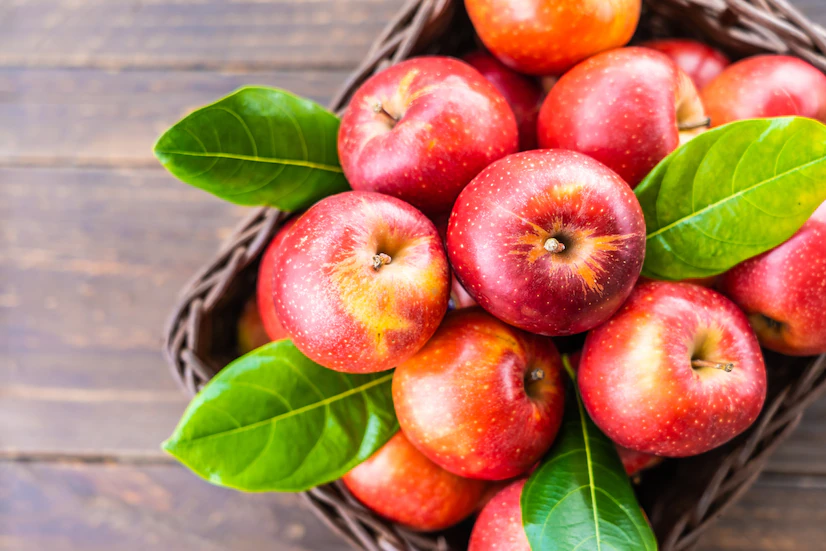Eating an apple a day has several potential health benefits. Here are some of the key benefits of incorporating apples into your daily diet:
- Apples are a good source of fiber: One medium apple contains about 4 grams of fiber, about 17% of the recommended daily intake for adults. Fiber is an essential nutrient that helps to regulate the digestive system, prevent constipation, and promote regular bowel movements. It can also help to lower cholesterol levels and reduce the risk of heart disease.
- Apples may help to improve gut health: The fiber in apples can help to support the growth of beneficial bacteria in the gut, which is vital for maintaining a healthy digestive system.
- Apples are low in calories: With just 95 calories per medium apple, they can be a great snack option for people looking to manage their weight.
- Apples may help to reduce the risk of certain cancers: Some studies have suggested that the antioxidants and other compounds found in apples may have anticancer properties. For example, one study found that women who ate apples had a lower risk of breast cancer than those who did not.
- Apples may help to lower the risk of heart disease: Apples contain compounds called flavonoids, which have been shown to help reduce the risk of heart disease. In addition, the fiber in apples can help lower cholesterol levels, another factor contributing to heart disease.
- Apples may help to improve brain health: Apples contain antioxidants called quercetin and kaempferol, which may have brain-protective effects. Some studies have found that people who eat more apples tend to have a lower risk of developing neurodegenerative diseases like Alzheimer’s disease.
- Apples may help improve lung function: Some studies have found that people who eat apples regularly tend to have better lung function than those who do not.
- Apples may help to reduce the risk of diabetes: Some research has suggested that the antioxidants and fiber in apples may help to lower the risk of type 2 diabetes.
- Apples may help to improve oral health: The texture of apples can help to stimulate saliva production, which can help to neutralize the acid in the mouth and reduce the risk of tooth decay.
- Apples are a good source of nutrients: In addition to fiber, apples are a good source of other important nutrients, including vitamin C, potassium, and manganese.

In summary, eating an apple a day can provide many potential health benefits, including improved gut health, a lower risk of certain cancers and heart disease, improved brain health, and better oral health. Apples are also a good source of fiber and other important nutrients, and they are low in calories, making them a great snack option for people looking to manage their weight.
Apples are a type of fruit native to Central Asia and have been cultivated for thousands of years.
They are one of the most widely grown and popular fruits in the world, and they are available in a wide range of colors, including red, green, yellow, and pink.
Apples are a good source of fiber and are low in calories, making them a healthy snack option. They are also a good source of vitamin C, potassium, and other nutrients. In addition to being eaten fresh, apples can also be used in various cooked dishes, such as pies, cakes, and sauces.
There are many different types of apples available, each with its own distinct flavor and texture. Some of the most popular types of apples include Red Delicious, Granny Smith, Gala, and Honeycrisp. Apples can be stored for several weeks in a cool, dry place, and they can also be frozen for longer-term storage.
In addition to being a nutritious food, apples have also been used for medicinal purposes for centuries. Some people believe that apples have various health benefits, such as helping to lower cholesterol levels and reduce the risk of heart disease and certain types of cancer. However, it is important to note that the evidence for these claims is not always strong, and more research is needed to fully understand the potential health benefits of apples.

Does Eating an apple a day have any disadvantages?
While apples have many potential health benefits, it’s important to note that they can also have some disadvantages in certain circumstances. Here are a few potential downsides to consider:
- Allergies: Some people may be allergic to apples, which can cause symptoms such as hives, swelling, and difficulty breathing. If you have an allergy to apples or any other type of food, it’s important to avoid consuming them and to seek medical attention if you experience any allergic reactions.
- Tooth decay: Apples contain natural sugars, which can contribute to tooth decay if they are not properly cleaned from the teeth. It’s important to brush and floss your teeth after eating apples to help remove any sugars and prevent tooth decay.
- Pesticides: Some apples are grown using pesticides, which can be harmful to humans if they are not properly washed off before the fruit is consumed. To reduce the risk of exposure to pesticides, it’s a good idea to wash apples thoroughly before eating them or to choose apples that are grown using organic farming methods.
- Weight gain: While apples are low in calories and can be a healthy snack option, it’s important to be mindful of portion sizes. If you eat too many apples or consume them in addition to other high-calorie foods, it could lead to weight gain.
Overall, apples are a nutritious and tasty food that can provide several potential health benefits. However, it’s important to be aware of any potential disadvantages and to consume them in moderation as part of a healthy and balanced diet.

How much protein does an average apple have?
Apples are a good source of nutrients, but they are not a significant source of protein. A medium-sized apple (182 grams) contains about 1 gram of protein. This is a relatively small amount compared to other protein sources, such as meats, dairy products, and beans.
While apples are not a significant source of protein, they can still be a valuable part of a balanced diet. They are low in calories and are a good source of fiber, vitamin C, and other nutrients. If you are trying to increase your protein intake, it’s a good idea to focus on other protein-rich foods, such as meats, dairy products, beans, and nuts.














Add Comment